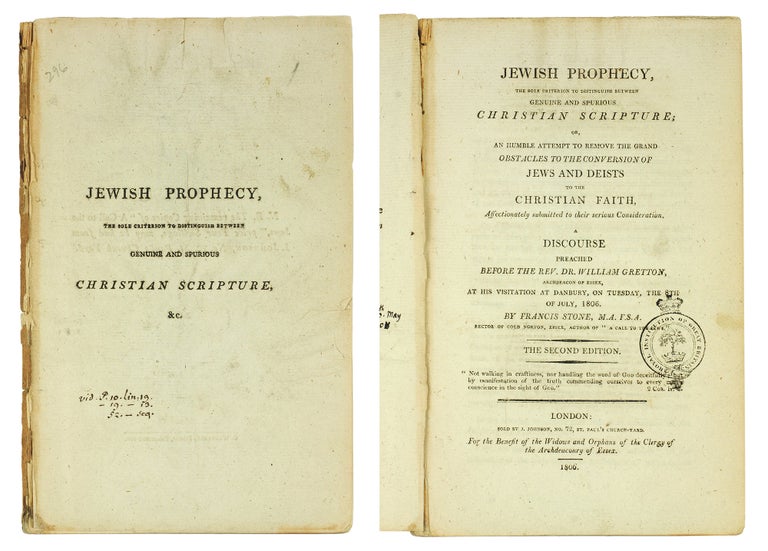
Jewish Prophecy, The Sole Criterion to Distinguish Between Genuine and Spurious Christian Scripture; or, An Humble Attempt to Remove the Grand Obstacles to the Conversion of Jews and Deists to the Christian Faith, Affectionately submitted to their serious Consideration. The Second Edition.
1806. London: Sold by J. Johnson, 1806.
Disbound 8vo., 48pp, title page loose, dingy. In paper envelope.
§ A scarce pamphlet, apparently revolutionary in nature as the Rev. Stone was defrocked and removed from his living. “Having adopted anti-trinitarian beliefs himself, Stone began to advocate extensive alterations in church and state. In A New Method of Discharging the National Debt (1776) he called for appropriation of church property, the payment to all churchmen of a uniform annual stipend of £200, and the removal of bishops from the House of Lords, subject to a life interest for sitting members. He supported the emancipation of slaves and a thoroughgoing reform of the House of Commons. In An Examination of … Burke's ‘Reflections’ (1792) he stoutly defended Richard Price and the French legislative assembly; his extended attack on Burke himself rose to a climax in his contemptuous (and often funny) dismissal of Burke's vision of Marie Antoinette.
Stone's fellow clergymen often found him difficult but tolerated his views. On 8 July 1806, however, he passed acceptable limits in a sermon at Danbury during the visitation of William Gretton (1736–1813), archdeacon of Essex. Published as Jewish prophecy the sole criterion to distinguish between genuine and spurious Christian scripture, the sermon rejected not only the Trinity but the virgin birth. Stone's offer to devote the profits of publication, amounting to £5, to a fund for the widows of Essex clergy was rejected 'with disdain'. Brought to trial on 13 May 1808 before Sir William Scott (afterwards Lord Stowell) in the consistory court of the bishop of London, Beilby Porteus, he was deprived of his living on 20 May; an appeal to the court of arches failed.” DNB. Item #105976
Price: $250.00

